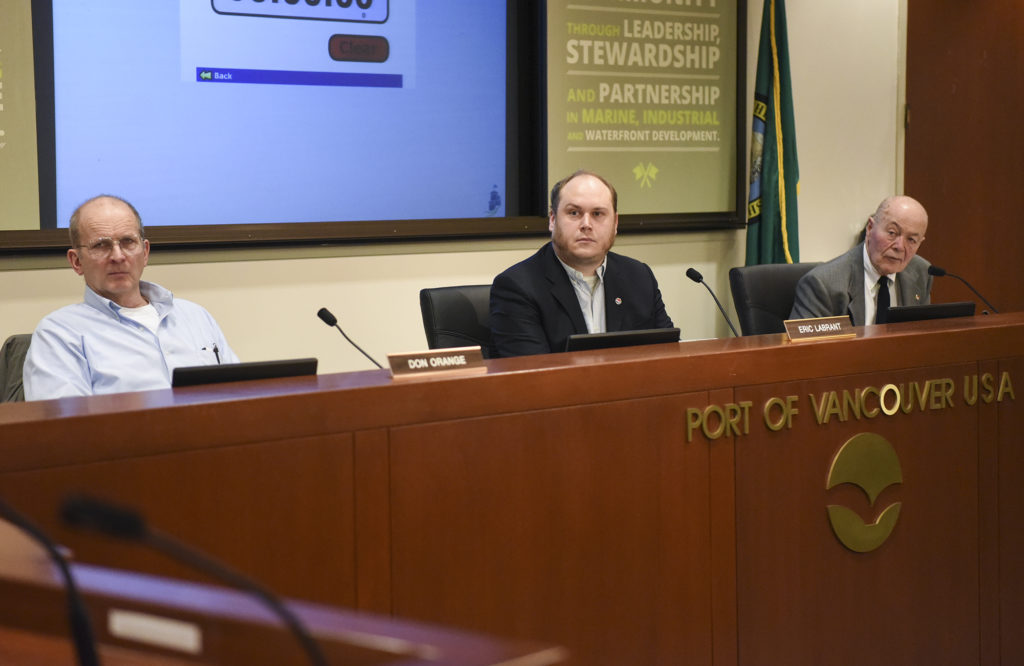It’s over.
The Port of Vancouver and Vancouver Energy, which wanted to build the nation’s largest rail-to-marine oil terminal at the port, mutually agreed to end the company’s lease Wednesday, a month early. Vancouver Energy will donate its $100,000 March lease payment to local nonprofits.
During its regular meeting Tuesday, the Port of Vancouver Board of Commissioners unanimously voted to delegate Port CEO Juliana Marler authority to approve a second amendment to the lease, moving up its termination date a month early. Before Tuesday’s vote, the lease would have ended March 31, unless Vancouver Energy obtained all permits, approvals and licenses it needed to operate its proposed oil terminal. That was highly unlikely considering just a month ago, Gov. Jay Inslee rejected the company’s Application for Site Certification.
Under state law, Vancouver Energy had 30 days to appeal Inslee’s decision in Thurston County Superior Court, but that window also closes Wednesday.
“Today’s amendment gives the community closure, and addresses the ‘what if’ question of whether Vancouver Energy would appeal the governor’s decision,” said Commissioner Eric LaBrant. “As the port continues the strategic planning process, this is a great opportunity to discuss our vision for the future, and what we want to pursue as a community going forward.”
In a news release, Marler said ending the lease early allows the port to actively market the parts of the property that were under lease.
“This makes a lot of sense for the port,” Marler said. “We’ve been actively marketing Terminal 5, and there’s been a high level of interest. With this amendment, we would have the ability to market additional rail capacity at Terminal 5 as well as Parcel 1A, which is rail-served industrial property.”
Parcel 1A was the location of the oil terminal’s proposed tank site.
Vancouver Energy Executive Director Jared Larrabee told the commissioners that the March lease payment will be donated to community groups in Southwest Washington through the Vancouver Energy Community Fund.
“While we do remain convinced that the proposal for the terminal would have provided immense value to the West Coast and this regional economy, and we also believe it’s incumbent on the stakeholders in Washington to improve the process for siting energy facilities in Washington, but our focus at this point in time is on creating a reconciliatory path and completing the project on a positive note, ending on a high note for the community and recognizing the positive relationships that we’ve all developed and built both with the port and the community at large,” Larrabee said.
The Community Fund was created in 2015 and is directed by a volunteer board of community members, who will evaluate needs and give the money to organizations that focus on education, public safety and environmental conservation and sustainability. The funds will be managed by the Community Foundation for Southwest Washington on behalf of the Vancouver Energy Community Fund.
The company says it has donated to 18 nonprofits and benefited more than 25,000 people since the fund’s inception.
The lease’s early termination came as welcome news to environmental groups who were involved in opposing the project from the beginning.
“The port and the people of Vancouver can now move forward and invest in infrastructure that reflects the community’s values and needs,” said Rebecca Ponzio, Stand Up To Oil campaign director. “The port’s action removes concerns about a lengthy appeals process and recognizes the broad and deep public opposition to the project.”
Vancouver Energy — a joint venture between Savage Cos. and Andeavor, formerly Tesoro Corp. — proposed building a $210 million rail-to-marine oil terminal at the port‘s Terminal 5. It would have transferred an average of 360,000 barrels of oil per day from numerous mile-long crude oil unit trains into marine vessels in the Columbia River bound for refineries along the West Coast. Vancouver Energy steadfastly claimed that the project would have brought more than 1,000 direct, indirect and induced jobs, and pump as much as $2 billion into the local and regional economy.
The terminal drove a wedge into the community. Project proponents were excited about the economic boon the terminal promised, yet many Vancouver residents opposed the project on the grounds of safety, environmental health and quality-of-life standards. Commissioners LaBrant and Don Orange, both first-time politicians, rode the wave of opposition straight into elected office in 2015 and 2017, respectively.
Starting in August 2013, the proposed oil terminal underwent more than four years of scrutiny by the Washington Energy Facility Site Evaluation Council. In November, the board recommended Gov. Jay Inslee reject the terminal based on five significant unavoidable impacts that could not be fully mitigated if it were to be built. Inslee heeded their recommendation.
Under state law, an energy facility evaluation is supposed to take just one year.




